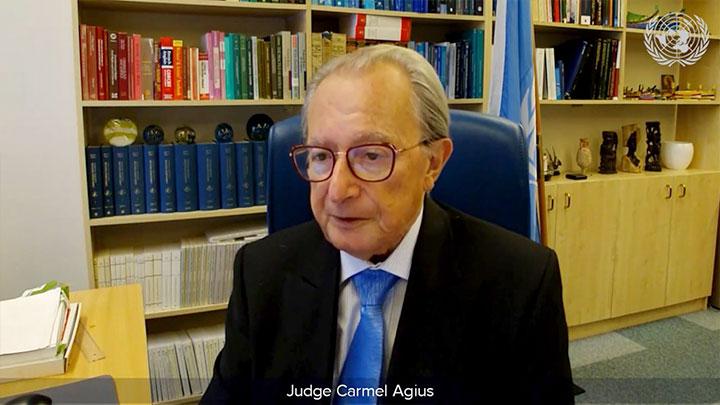President Agius briefs UN Security Council on progress of Mechanism’s work

The President of the International Residual Mechanism for Criminal Tribunals (Mechanism), Judge Carmel Agius, yesterday presented the Mechanism’s eighteenth progress report to the United Nations Security Council by video-teleconference from The Hague.
President Agius opened his address by informing the Security Council that, in its Judgement pronounced just a few hours earlier, the Appeals Chamber of the Mechanism had affirmed Mr. Ratko Mladić’s convictions and the sentence of life imprisonment imposed on him by a Trial Chamber of the International Criminal Tribunal for the former Yugoslavia (ICTY). Reflecting on the broader impact of the Judgement, the President underscored: “The issuance of the final Judgement sends a strong message to victims of atrocities committed in the former Yugoslavia and elsewhere, that perpetrators of such heinous crimes will ultimately be brought to justice, regardless of their position or how powerful and untouchable they consider themselves to be.” He invited Members of the Council to read the Judgement, which is publicly available on the Mechanism’s website.
In relation to other cases before the Mechanism, President Agius confirmed that judgements in both the Stanišić & Simatović retrial and the Nzabonimpa et al. contempt trial are also expected to be delivered by the end of June 2021. In the case against Mr. Félicien Kabuga, a Status Conference was held on 1 June and a pre-trial work plan was recently announced.
Turning to the Mechanism’s responsibilities in the area of enforcement, the President conveyed deep appreciation for the invaluable contribution of the 15 United Nations Member States in Africa and Europe that are currently enforcing the sentence of one or more convicted persons. He expressed sincere hope that additional States will step forward and enter into enforcement agreements with the United Nations for the same purpose.
Further with respect to Member States’ cooperation, President Agius reiterated that the Mechanism depends on the international community’s assistance to resolve the longstanding situation of the acquitted and released persons in Arusha. Emphasising the fundamental importance of resettling these individuals, the President noted that the Security Council’s continued leadership, and the cooperation and support of Member States, are essential in tackling this situation once and for all.
President Agius then drew the Council’s attention to his letter of 11 May 2021 informing Member States of the Republic of Serbia’s continued failure to comply with its international obligations to arrest and surrender Mr. Petar Jojić and Ms. Vjerica Radeta to the Mechanism. He noted that over six years have passed since the ICTY first requested Serbia to execute arrest warrants in relation to these accused persons, and that this is the third time that Serbia’s failure to cooperate has been reported to the Security Council. Finally, President Agius emphasised that “Serbia’s inaction not only undermines the effective administration of justice before the Mechanism, but also defies the international community by challenging the Security Council’s authority and the United Nations Charter.”
In concluding, President Agius paid tribute to the Council and the international community at large, whose support he considers to be the “backbone of the Mechanism’s success”. After thanking the Mechanism’s Host States, its enforcement States and all Security Council Members for their unwavering support and admirable commitment, the President encouraged others “to follow suit so that the Mechanism lives up to its potential and that international criminal justice delivers on its promise”.